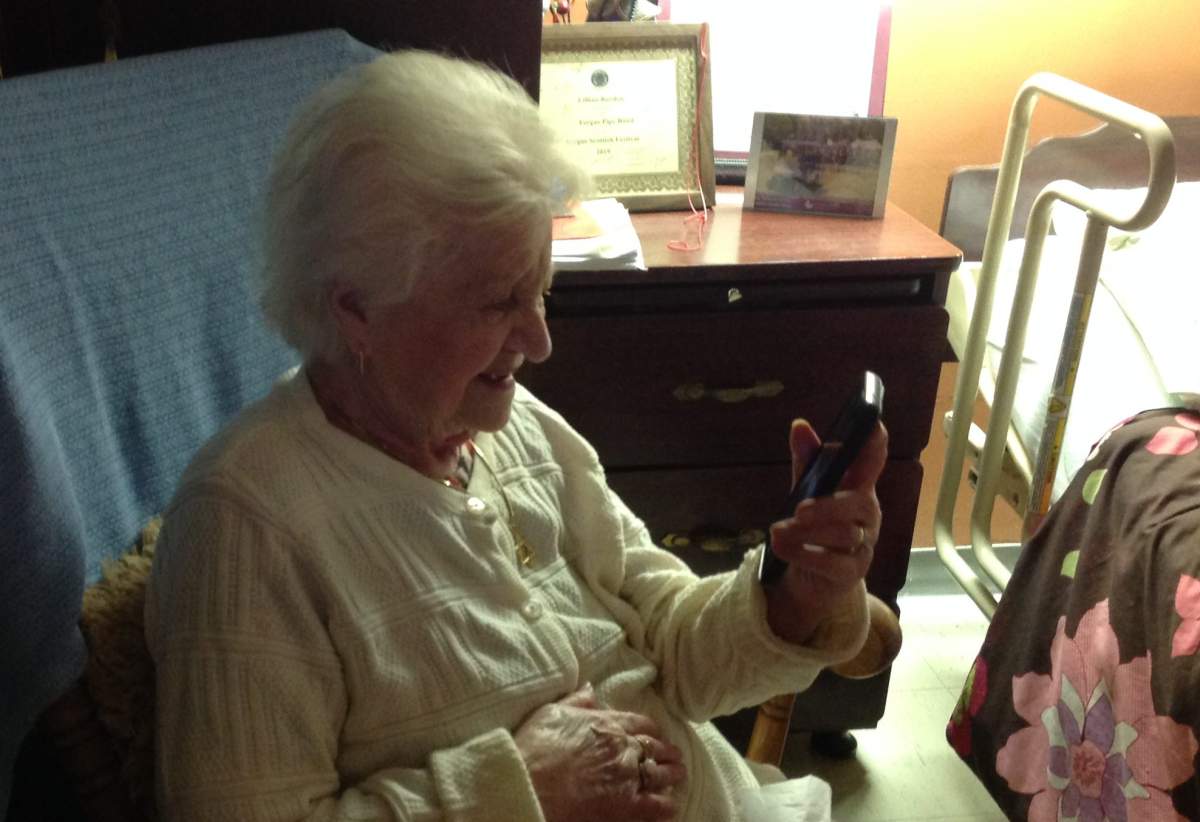Sheri St. Denis’ grandmother, Lilian Burden — whom she calls ‘bubby’ — lives in a nursing home in Toronto.

In early March, staff announced three confirmed cases of the new coronavirus in the same home. All residents were immediately isolated to their rooms and guests were forbidden from visiting in an attempt to control the spread.
“I felt very scared and helpless,” St. Denis said. “All I wanted to do was be there with her and hold her hand, but I couldn’t.”
St. Denis is just one of thousands of Canadians who fear for family living in a nursing home or long-term care facility during the COVID-19 pandemic. These homes have been disproportionately targeted by the virus, and hundreds of these spaces continue to grapple with fatal outbreaks.
However, St. Denis also worries about Burden’s mental health and overall happiness during isolation.
“I started thinking about how I could cheer her up,” she said.
St. Denis, who lives in Prince Edward Island, realized she is “surrounded” by people who know how to play the bagpipes, so she posted online asking for videos of people’s performances.
“I got an overwhelming response from people all across the Maritimes,” St. Denis said.
With the help of the caregivers at the facility, St. Denis and her bubby connected with video chat and St. Denis showed her the videos.
“The smile on her face was priceless.”
Video chat is just one of the ways Canadians are staying in touch with loved ones during this difficult time.
Ashley Sumler, manager of life enrichment at Amica Senior Lifestyles in Toronto, says facilitating these social connections is a top priority for her team during COVID-19.

Get breaking National news
“As a demographic, seniors are at increased risk for social isolation everyday, but especially during the pandemic,” Sumler said.
“Staying connected with family and friends helps residents to share and acknowledge feelings coming up through this experience, and to know they are supported and that we’re all in this together.”
The team at Amica has started using social media, video calls and other technology to keep residents connected to family.
At Amica Aspen Woods in Calgary, a resident suggested moving choir practice to the balconies.
“The group sing enabled residents to safely connect again over their shared passion of singing, lifted spirits and connected the senior community,” said Sumler.
The team at Amica has also helped families say hello from a distance.
“We have supported our residents to see their grandchildren virtually, or to have a balcony visit from the sidewalk on a special occasion,” she said.
Sienna Senior Living, another retirement community with locations in Ontario and British Columbia, is also trying new ways to keep residents connected with friends and family during this time.
“It’s important we do everything we can to help residents stay connected with their loved ones as it helps them stay connected to what’s happening outside and allows for some degree of normalcy,” communications specialist Laura Condie said.
To that end, staff are doing anything they can to facilitate video calls, sidewalk visits and more.
At a Sienna Senior Living residence in Bobcaygoen, Ont., staff created something called “red bench visits.”
They placed chairs on either side of a window, allowing families to come see their loved ones through the glass.
“Families play a crucial role in caring for residents,” Condie said.
Questions about COVID-19? Here are some things you need to know:
Health officials caution against all international travel. Returning travellers are legally obligated to self-isolate for 14 days, beginning March 26, in case they develop symptoms and to prevent spreading the virus to others. Some provinces and territories have also implemented additional recommendations or enforcement measures to ensure those returning to the area self-isolate.
Symptoms can include fever, cough and difficulty breathing — very similar to a cold or flu. Some people can develop a more severe illness. People most at risk of this include older adults and people with severe chronic medical conditions like heart, lung or kidney disease. If you develop symptoms, contact public health authorities.
To prevent the virus from spreading, experts recommend frequent handwashing and coughing into your sleeve. They also recommend minimizing contact with others, staying home as much as possible and maintaining a distance of two metres from other people if you go out.
For full COVID-19 coverage from Global News, click here.
— With files from Global News’ Olivia Bowden
Meghan.Collie@globalnews.ca














Comments
Want to discuss? Please read our Commenting Policy first.